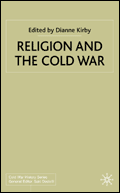Author's response
| Book: | Religion and the Cold WarDianne Kirby, ed.Basingstoke: Palgrave, 2003 ISBN: 0333993985; pp. 245. |
| Reviewer: | Merrilyn ThomasUniversity College London |
Given that this is essentially a favourable review, with some constructive suggestions, I can only welcome and agree with its sentiments. Owing to its positive nature, it is perhaps understandable that I should consider the review to be fair and judicious. However, other reviewers have also responded well to the book, pointing to the same attributes to which Dr Thomas draws attention. To date, in fact, the book has been pleasingly received and broadly welcomed as a valuable contribution to Cold War scholarship and greeted as one that should promote further research and scholarly endeavour.
Dr Thomas, who herself is doing significant work in the realm of religion and the Cold War, ably identifies cogent aspects of the collection, revealing her own insights and grasp of this fascinating and complex field. I was particularly taken with her reference to religion being the 'Cinderella of Cold War historiography', which nicely sums up its previous neglect.
Dr Thomas recognises that the book had a limited aim, to show that 'religion mattered' and to encourage further examination of the consequences of its relationship with power in the international arena. She generously concludes that the book does achieve its aim and she understands that to have done more would have required a wider spread of essays. Dr Thomas rightly notes the bias towards the Catholic Church and points to other areas that she feels deserve examination. She particularly regrets the lack of a piece on the World Council of Churches. I could have rectified this omission, but it would have meant another essay from me. (1)
There were other serious omissions that Dr Thomas kindly refrained from mentioning. Although entitled Religion and the Cold War, the reality is that the book deals exclusively with Christianity. However, some of the lessons to be learned from Christianity are applicable to religion in general. My endeavours to find additional authors willing to discuss Judaism, Islam and other non-Christian religions in a Cold War context proved futile, clearly indicating that here is an area ripe for research. My hope is that scholars of other religions who see the book will be moved by their non-representation to seek to rectify this very serious gap in the scholarship.
I will be well satisfied if the work and effort that went into the conference and the editorship results, as Dr Thomas suggests it will, in opening the door for future researchers into the subject of religion and the Cold War. It was intended as a first step and I will be delighted if it inspires others to give some attention to what I know they will find a fruitful area.
Concluding my introduction, I observed: 'Today as perhaps never before, it is of increasing importance that scholars and statesmen turn their attention to understanding the political influence of religion, its role in the international arena and in the hearts and minds of men.' It is an observation that contemporary events since the book's publication have made yet more cogent. Scholars of the Cold War need to highlight the many similarities between it and the 'War on Terror'. Those of us interested in the religious dimension need to explore the way in which the use of Islam to combat communism and militant secular Arab nationalism contributed to the ongoing Middle East crisis. There remains a great deal of work to be undertaken in understanding the role of religion in our Cold War past, but it will help us understand and make better informed speculations about our post-Cold War future, not least in the realm of the 'War on Terror'.
January 2004
Notes
- For those wanting to know more about the WCC and the Cold War, please see D. Kirby, 'Harry S. Truman's international religious anti-Communist front, the Archbishop of Canterbury and the 1948 inaugural Assembly of the World Council of Churches', Contemporary British History, 15: 4, (2001), 35–70. Back to (1).

